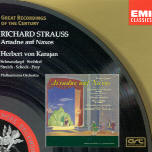This recording of Ariadne has long been considered a classic, and it’s easy to tell why. Herbert von Karajan and the Philharmonia play Richard Strauss’ chamber-like score with great understanding and a real feel for the individual colors needed for each scene. Strauss wanted the intimacy of a solo piano as much as he wanted a full orchestral sound–each has its place here–and no matter which is present the balance is always right (Walter Legge produced). Elisabeth Schwarzkopf is probably the finest Araidne ever recorded, her voice in full bloom, her artistry never falling into artifice except during her brief moments as the Prima Donna, where it is very much in place. Irmgard Seefried’s Composer also may be the finest available, with the voice warm and rich at both ends and with an impetuosity and Romantic spirit that defines the character. Rita Streich’s little-voiced Zerbinetta is nonetheless right-on, with nice sarcasm and plenty of attitude. Rudolf Schock’s Bacchus always was the set’s weak link, and his occasional bleating still annoys, but then again, this seems to be an almost uncastable role. The supporting players are all superb, with Hermann Prey’s Harlekin a real bonus. The mono sound has stood up well.
































